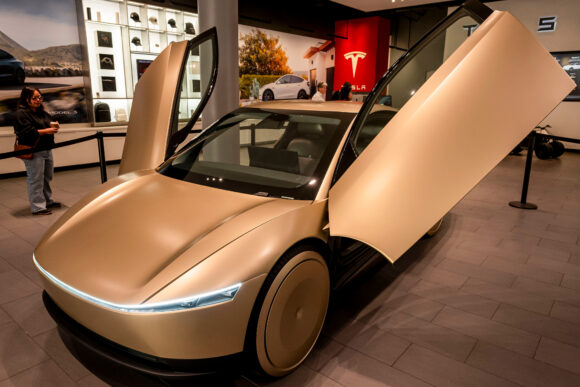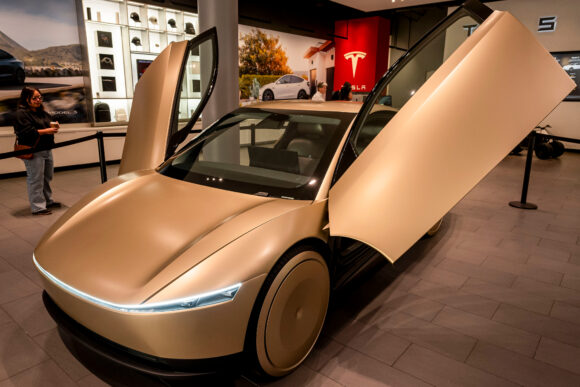Tesla Inc. is poised to begin its long-awaited robotaxi service in Austin on June 12, according to a person familiar with the matter, a milestone in Elon Musk’s plan to reshape the company around driverless vehicles and artificial intelligence.
The previously unreported date was discussed internally and could still change, said the person, asking not to be identified because the information is private. Musk has previously said the service would begin by the end of June.
In preparation for the launch, the company this week operated a test vehicle on public roads in Austin with no one in the driver’s seat for the first time, according to the person. A Tesla engineer was riding in a passenger seat of a Model Y SUV, which drove autonomously with no remote operation, the person said.
Tesla didn’t immediately respond to requests for comment.
The planned start of autonomous service builds upon testing that the electric-vehicle maker has been doing recently with safety drivers around the city, carrying employees ahead of the public rollout. Musk, Tesla’s chief executive officer, has said robotaxi service — initially using consumer models before eventually incorporating a purpose-built vehicle known as Cybercab — will be central to Tesla’s business in the future.
Its shares rose 1.1% as of 4:09 p.m. after regular trading in New York. The stock declined 12% this year through Wednesday’s close.

The company demonstrated the Cybercab at a flashy event last year in California, giving attendees rides in prototypes of the vehicle, which will have no steering wheel or pedals. But the routes were on private land, sidestepping permitting requirements.
Texas, where Tesla is headquartered, has relatively relaxed rules around autonomous driving, which is regulated much like any other type of passenger vehicle operation. The driverless vehicles are required to have cameras and be able to follow traffic laws and have insurance. The Texas Department of Licensing and Regulation, which regulates rideshare services, doesn’t currently list Tesla as a rideshare licensee.
The city of Austin doesn’t regulate self-driving vehicles, but has set up a task force that coordinates with Tesla and other autonomy companies.
The state capital has become a focal point for the growing robotaxi industry, with companies such as Alphabet Inc.’s Waymo already operating there. Tesla vehicles with manufacturer plates have become a frequent sight in the south and southeast portions of the city as the company has expanded testing with safety drivers.
Musk said this month that Tesla would initially roll out a fleet of about 10 self-driving robotaxis in Austin before expanding to a thousand vehicles within a few months.
Topics Tesla
Was this article valuable?
Here are more articles you may enjoy.



 Former Broker, Co-Defendant Sentenced to 20 Years in Fraudulent ACA Sign-Ups
Former Broker, Co-Defendant Sentenced to 20 Years in Fraudulent ACA Sign-Ups  Jury Finds Johnson & Johnson Liable for Cancer in Latest Talc Trial
Jury Finds Johnson & Johnson Liable for Cancer in Latest Talc Trial  Insurance Broker Stocks Sink as AI App Sparks Disruption Fears
Insurance Broker Stocks Sink as AI App Sparks Disruption Fears  World’s Growing Civil Unrest Has an Insurance Sting
World’s Growing Civil Unrest Has an Insurance Sting 

